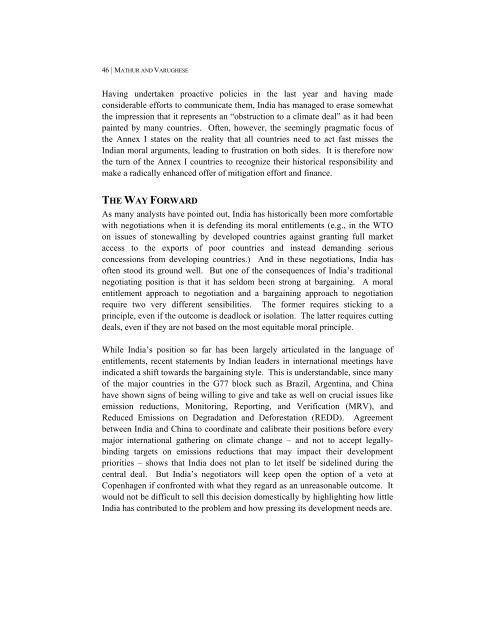Indian Climate Policy - Global Commons Institute
Indian Climate Policy - Global Commons Institute
Indian Climate Policy - Global Commons Institute
You also want an ePaper? Increase the reach of your titles
YUMPU automatically turns print PDFs into web optimized ePapers that Google loves.
46 | MATHUR AND VARUGHESE<br />
Having undertaken proactive policies in the last year and having made<br />
considerable efforts to communicate them, India has managed to erase somewhat<br />
the impression that it represents an “obstruction to a climate deal” as it had been<br />
painted by many countries. Often, however, the seemingly pragmatic focus of<br />
the Annex I states on the reality that all countries need to act fast misses the<br />
<strong>Indian</strong> moral arguments, leading to frustration on both sides. It is therefore now<br />
the turn of the Annex I countries to recognize their historical responsibility and<br />
make a radically enhanced offer of mitigation effort and finance.<br />
THE WAY FORWARD<br />
As many analysts have pointed out, India has historically been more comfortable<br />
with negotiations when it is defending its moral entitlements (e.g., in the WTO<br />
on issues of stonewalling by developed countries against granting full market<br />
access to the exports of poor countries and instead demanding serious<br />
concessions from developing countries.) And in these negotiations, India has<br />
often stood its ground well. But one of the consequences of India’s traditional<br />
negotiating position is that it has seldom been strong at bargaining. A moral<br />
entitlement approach to negotiation and a bargaining approach to negotiation<br />
require two very different sensibilities. The former requires sticking to a<br />
principle, even if the outcome is deadlock or isolation. The latter requires cutting<br />
deals, even if they are not based on the most equitable moral principle.<br />
While India’s position so far has been largely articulated in the language of<br />
entitlements, recent statements by <strong>Indian</strong> leaders in international meetings have<br />
indicated a shift towards the bargaining style. This is understandable, since many<br />
of the major countries in the G77 block such as Brazil, Argentina, and China<br />
have shown signs of being willing to give and take as well on crucial issues like<br />
emission reductions, Monitoring, Reporting, and Verification (MRV), and<br />
Reduced Emissions on Degradation and Deforestation (REDD). Agreement<br />
between India and China to coordinate and calibrate their positions before every<br />
major international gathering on climate change – and not to accept legallybinding<br />
targets on emissions reductions that may impact their development<br />
priorities – shows that India does not plan to let itself be sidelined during the<br />
central deal. But India’s negotiators will keep open the option of a veto at<br />
Copenhagen if confronted with what they regard as an unreasonable outcome. It<br />
would not be difficult to sell this decision domestically by highlighting how little<br />
India has contributed to the problem and how pressing its development needs are.
















